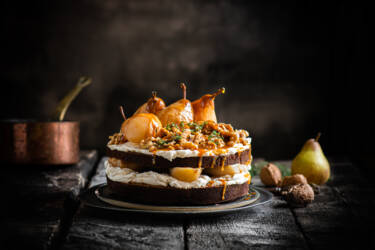How to photograph Christmas food with Donna Crous

Food photographer Donna Crous on making the most out of directional lighting and bokeh and her go-to Christmas food settings
The festive season is the perfect time to level up your food photography. For a dark and moody style, looking beyond the traditional greens and reds of Christmas, follow food photographer and author Donna Crous’ top tips below.
Find a dark background and set aperture to f/4 to f/1.7
“Whether it’s a dark sheet or a dark cupboard, stick up a few Christmas lights – white, pure white, coloured, you name it – in the background using masking tape that isn’t visible in the frame,” says Donna. “Adjust to your desire. You could have lots of lights or just a few dropping at an angle. Once you’ve set up your table, move it away from the background. The further away you move, the greater the separation and the opportunity for bokeh (also known as beautiful, blurred background).”
Donna Crous

For beginners, use the NIKKOR Z 50mm f/1.8 lens
If you have a FX camera (Z 6II, Z 7II, Z 8 and so on), invest in the affordable NIKKOR Z 50mm f/1.8 lens. This prime lens offers a ‘normal’ focal length as the midpoint between wide-angle and telephoto, offering a flattering view of your subjects. You can use the 50mm f/1.8 on a DX camera too, but remember to factor in crop factor.
Read more: What is a prime lens?
For advancing, use the NIKKOR Z MC 105mm f/2.8 VR S
“With the 105m macro, I love being able to get really close to my subjects,” Donna explains. This macro has a 0.29m (0.96 ft) minimum focus distance and a reproduction ratio of 1:1 meaning your subject will always be true to life. Donna’s top tip? Place your background far away, open your aperture wide and make sure your subject is in focus.
Read more: Beginner styling tips to elevate your food photography
Use small serving plates
“Shooting food almost always looks better on smaller serving dishes and cutlery,” says Donna. Start with your subject and build organically, finding blank spaces that you might want to fill. Switch up your styles, too. First, try the minimalist approach: place a Christmas cake on a stand or plate and add lights in the background. “The power here is the cake as a focused subject,” explains Donna. “And the Christmas lights in the background are your story. Here you’re keeping it simple and focusing on photographic technique rather than styling the actual dish. Or go for abundance, with loads of different dishes replicating the dinner table, and be less heavily focused on the background.”
Photograph with directional lighting
“Use directional lighting (light coming from left or right) or backlighting, but never front lighting as it often makes the subject dull and two-dimensional,” advises Donna. Turn off your ceiling lights, find a window where you can easily enough set your food up and close any other blinds if necessary if the additionally lighting source is distracting. Set your White Balance to Auto or, if it’s a really difficult time of the day where things can turn blue, adjust the Kelvin settings in the menu.
Try different textures
“I love layering textures,” smiles Donna, “especially wooden chopping boards or bowls. An absolute gold for food photographers is a scratched or slightly rusted orange-black chopping board.” Donna recommends buying a vinyl background online for an affordable way to jazz up your background. Her favourite companies are Capture by Lucy and Black Velvet Styling.


Make your food look delicious
Before your Christmas dinner celebrations fully start, ensure your food isn't overcooked. Remember a brush of olive oil makes food shine beautifully if cooled and looking a tad dull. “When I first started photographing, I would cook the family meal, pull it out of the oven and then quickly photograph it – I’d almost always have to tell everyone to wait before they tucked in!” says Donna. “Of course, if it’s food everyone’s going to eat, make sure to cook it to instructions and ensure you have an idea before the food is served about how you will use your props and fabrics. Every image needs a story. So photograph your Christmas food on the table or stand on a chair for a better angle. If in doubt, place the dish in someone’s hand and photograph with a wide aperture to blur the background. Ensure your table is straight using grid lines in your viewfinder or use a tripod with a spirit level in the hotshoe mount of the camera.
Photograph in portrait orientation
“Food always looks better in portrait orientation, plus it’s easier to style,” explains Donna. It’s also better when posting on social media as a portrait image fills the whole screen of the phone.


Donna’s post-production checklist:
Mask your subject
- To add texture, up your vibrance and saturation and remove any details not wanted.
- If there is wood in the photograph, increase the clarity and texture of the wood to really make it stand out and pop.
Add a vignette
- Vignetting is a style choice, but Donna loves the way it draws the eye into the middle of the photograph and makes the subject stand out.
Brush over lighter areas
- Donna often colours the lighter areas of the photo so that it looks like a sunrise or sunset light has passed over the image.
Donna Crous is an award-winning photographer, author, blogger and member of the Nikon family, living in Jersey, Channel Islands. Her first recipe book, A Healthier Family for Life: Stress-free feasts for a multi-diet family,was published in 2021. Follow her culinary adventures here.
Discover more in Tips & Tricks
Featured products
Discover our festive content
9 top tips for photographing Christmas markets

Unlock greater creativity














